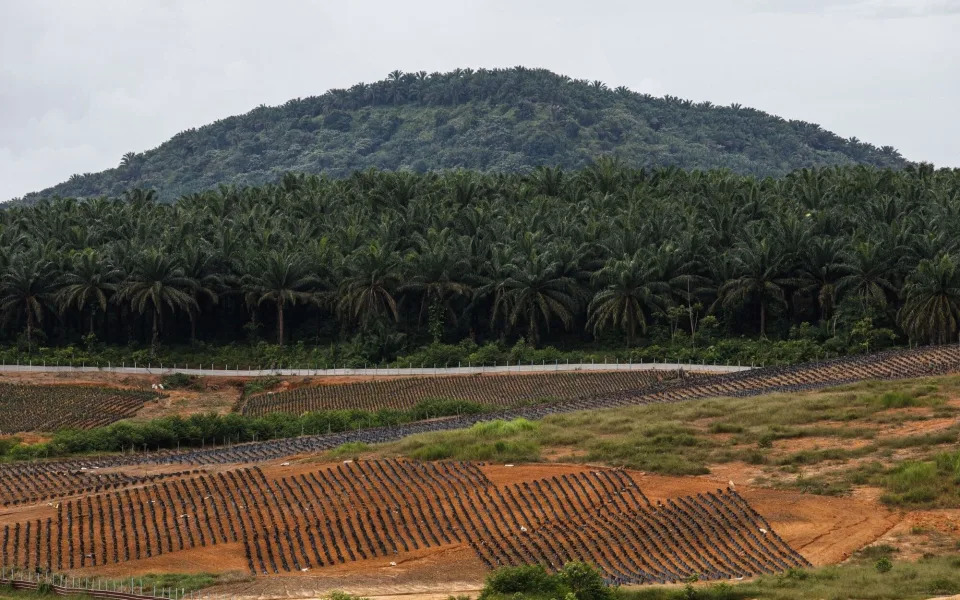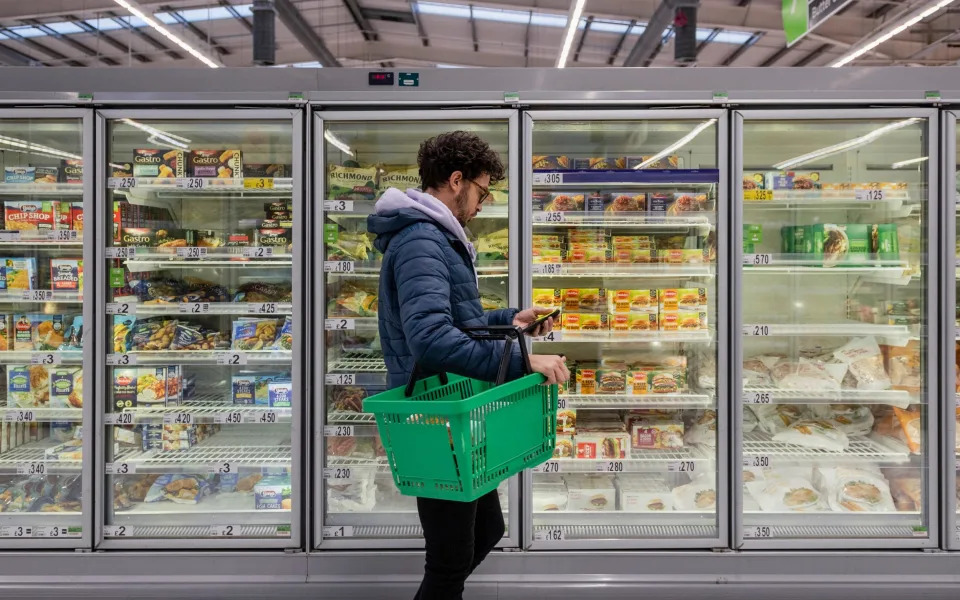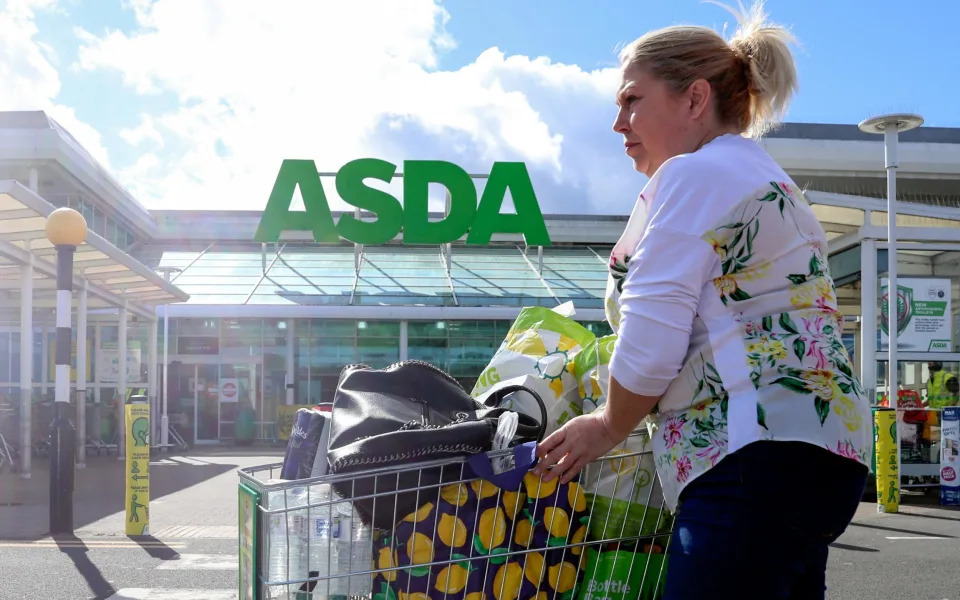Emma Gatten
Sat, 9 December 2023

Palm oil in products will only be allowed under the new legislation if it is from trees that have been legally felled - SAMSUL SAID/BLOOMBERG
Supermarkets will be forced to ensure that products on their shelves do not contribute to illegal deforestation, the environment secretary will announce today.
Steve Barclay will say palm oil, cocoa, beef, leather and soy products will be covered by the legislation, in an attempt to stop British products contributing to deforestation, in a speech at the Cop28 climate conference in Dubai.
Agricultural expansion causes an area the size of the UK to be ploughed up each year to meet British demand for products.
“I find it heart-rending to see the way illegal deforestation is destroying the habitats of tigers, jaguars, orangutans and many other endangered species, and I know many people across the world feel the same,” Mr Barclay said.
“It’s why we are cleaning up supply chains to make sure that big businesses in the UK aren’t responsible for illegal deforestation.
“It also means shoppers can be confident that the money they spend is part of the solution, rather than part of the problem.”
The legislation was first introduced in the 2021 Environment Act, but could not be enforced until the Government had laid out the products to which it would apply.
Green groups have said the laws do not go far enough because they only cover illegal deforestation.
Some 70 per cent of deforestation for global products is illegal, but there is little understanding of where goods on British shelves come from.
Clean up supply chains
Several supermarkets have already vowed to clean up their supply chains to stop illegal deforestation for products such as soy.
Under the new legislation, businesses that have a global annual turnover of £50 million and use over 500 tonnes of regulated commodities a year will be banned from using them if sourced from land used illegally.
These businesses will also be required to undertake a due diligence exercise on their supply chains and to report annually.
Tanya Steel, CEO of WWF, which has pushed for the legislation, said it was “an important first step to getting illegal deforestation off UK shopping shelves.”
“However illegal deforestation is only part of the picture – with wildlife numbers plummeting and wild habitats facing destruction, we must stop felling forests, full stop,” she said. “Forests absorb 30% of the carbon we emit from burning fossil fuels, so nature is clearly our greatest ally in tackling climate change.”
Major food companies ‘acting like Big Tobacco’ by selling addictive and harmful products
Laura Donnelly
Sat, 9 December 2023

A study in 2017 found that poor diet was responsible for 10.9 million deaths globally in 2017, compared with eight million for tobacco - E+/SOLSTOCK
Processed food manufacturers pose as big a risk to public health as tobacco companies, a leading food expert has claimed.
Dr Chris van Tulleken, associate professor at University College London, said the mass-produced food industry was acting in a similar way to Big Tobacco firms by selling addictive products which could be harmful.
He claimed major food companies were putting the pursuit of profits above public health, especially when marketing snacks and processed foods to children.
“These companies are using the same techniques as tobacco firms to create and then market addictive food, especially to children,” he said. “Poor diet has overtaken tobacco as the leading cause of death globally – and poor diet means an ultra-processed diet.”
Ultra-processed foods go through multiple processes during manufacturing, are often high in salt and sugar, and contain additives, emulsifiers and preservatives.
They are typically lacking in fibre and nutrients but are high in calories.
Most junk food is ultra-processed, including ready meals, frozen pizzas, shop-bought cakes and potato-based snacks. But many foods which have traditionally been considered “healthy” are also ultra-processed, including supermarket sliced bread, “low fat” and “diet” foods and drinks, and packaged snacks aimed at preschool children.
Speaking at the Unicef UK Baby Friendly Initiative Conference in Harrogate last month, Dr van Tulleken said: “We have a real crisis of industrialised, processed foods being marketed to children… We are sure that these foods have addictive properties for both children and adults.”
Dr van Tulleken, who is the author of Ultra-Processed People, described ultra-processed food as “food made with the cheapest possible ingredients which is made with the purpose of generating money for an institutional investor”.
Poor diet a bigger killer
An analysis of deaths in 195 countries, published in The Lancet in 2019, found poor diet is now responsible for more deaths worldwide than tobacco.
The study, led by the US-based Institute for Health Metrics and Evaluation, found poor diet was responsible for 10.9 million deaths globally in 2017, compared with eight million for tobacco.
Tobacco companies have a long history of interest in mass-produced foods.
American cigarette makers Philip Morris and R J Reynolds owned some of the world’s biggest food manufacturers, including General Foods, Kraft and Nabisco, from the 1980s to the mid-2000s, during which time there was a surge in worldwide consumption of ultra-processed foods.
The companies – now merged as Kraft Heinz – continue to sell Heinz baby food and snacks, as well as popular brands like Heinz beans, Philadelphia cheese spread and Capri-Sun drinks.
“It’s not just that these [food manufacturers] are comparable to tobacco companies, they were the tobacco companies,” Dr van Tulleken added. “The tobacco industry used its knowledge about flavour and marketing to create and market addictive food, especially to children.”
Healthier choices
A spokesperson for the Food and Drink Federation, which represents the food industry, said: “Processing allows us to make the safe, delicious and nutritious food and drink enjoyed by households across the country each day and ensures consumers have a range of choice on the supermarket shelves with products at every price point… Over a number of years, we have invested a great deal in changing the recipes of our products to remove fat, sugar and salt and to add more fibre, fruit and vegetables. We’ve also reduced portion sizes and launched new, healthier products.”
The Department for Health and Social Care said it had introduced calorie labelling in restaurants and required pre-packaged foods to carry “a variety of information to aid shoppers – including a list of ingredients and nutritional data”.
A government spokesperson said: “We are taking strong action to encourage healthier food choices and to tackle obesity – recognising that it is the second biggest cause of cancer and costs the NHS around £6.5 billion a year – while respecting the importance of individual choice.”
Laura Donnelly
Sat, 9 December 2023

A study in 2017 found that poor diet was responsible for 10.9 million deaths globally in 2017, compared with eight million for tobacco - E+/SOLSTOCK
Processed food manufacturers pose as big a risk to public health as tobacco companies, a leading food expert has claimed.
Dr Chris van Tulleken, associate professor at University College London, said the mass-produced food industry was acting in a similar way to Big Tobacco firms by selling addictive products which could be harmful.
He claimed major food companies were putting the pursuit of profits above public health, especially when marketing snacks and processed foods to children.
“These companies are using the same techniques as tobacco firms to create and then market addictive food, especially to children,” he said. “Poor diet has overtaken tobacco as the leading cause of death globally – and poor diet means an ultra-processed diet.”
Ultra-processed foods go through multiple processes during manufacturing, are often high in salt and sugar, and contain additives, emulsifiers and preservatives.
They are typically lacking in fibre and nutrients but are high in calories.
Most junk food is ultra-processed, including ready meals, frozen pizzas, shop-bought cakes and potato-based snacks. But many foods which have traditionally been considered “healthy” are also ultra-processed, including supermarket sliced bread, “low fat” and “diet” foods and drinks, and packaged snacks aimed at preschool children.
Speaking at the Unicef UK Baby Friendly Initiative Conference in Harrogate last month, Dr van Tulleken said: “We have a real crisis of industrialised, processed foods being marketed to children… We are sure that these foods have addictive properties for both children and adults.”
Dr van Tulleken, who is the author of Ultra-Processed People, described ultra-processed food as “food made with the cheapest possible ingredients which is made with the purpose of generating money for an institutional investor”.
Poor diet a bigger killer
An analysis of deaths in 195 countries, published in The Lancet in 2019, found poor diet is now responsible for more deaths worldwide than tobacco.
The study, led by the US-based Institute for Health Metrics and Evaluation, found poor diet was responsible for 10.9 million deaths globally in 2017, compared with eight million for tobacco.
Tobacco companies have a long history of interest in mass-produced foods.
American cigarette makers Philip Morris and R J Reynolds owned some of the world’s biggest food manufacturers, including General Foods, Kraft and Nabisco, from the 1980s to the mid-2000s, during which time there was a surge in worldwide consumption of ultra-processed foods.
The companies – now merged as Kraft Heinz – continue to sell Heinz baby food and snacks, as well as popular brands like Heinz beans, Philadelphia cheese spread and Capri-Sun drinks.
“It’s not just that these [food manufacturers] are comparable to tobacco companies, they were the tobacco companies,” Dr van Tulleken added. “The tobacco industry used its knowledge about flavour and marketing to create and market addictive food, especially to children.”
Healthier choices
A spokesperson for the Food and Drink Federation, which represents the food industry, said: “Processing allows us to make the safe, delicious and nutritious food and drink enjoyed by households across the country each day and ensures consumers have a range of choice on the supermarket shelves with products at every price point… Over a number of years, we have invested a great deal in changing the recipes of our products to remove fat, sugar and salt and to add more fibre, fruit and vegetables. We’ve also reduced portion sizes and launched new, healthier products.”
The Department for Health and Social Care said it had introduced calorie labelling in restaurants and required pre-packaged foods to carry “a variety of information to aid shoppers – including a list of ingredients and nutritional data”.
A government spokesperson said: “We are taking strong action to encourage healthier food choices and to tackle obesity – recognising that it is the second biggest cause of cancer and costs the NHS around £6.5 billion a year – while respecting the importance of individual choice.”













